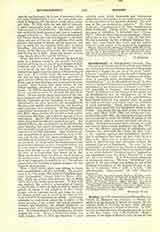

Establishment (or ESTABLISHED CHURCH), the.—The union of Church and State setting up a definite and distinctive relation between the two is frequently expressed in English by the use of the word “establishment”, applied to such union in both Catholic and Protestant States, in spite of the fundamental differences of principle which characterize them. “The Establishment”, or “the Established Church” is often used as a distinctive name for the ecclesiastical system established by law in Scotland, in Ireland (until 1869), but especially in England. The pre-Reformation Church of England was the religion of the people and its establishment was the spontaneous act of the people; the distinctive feature of the post-Reformation Church is that it was imposed upon the people by legal enactment, and based upon the principle of royal supremacy. Papal jurisdiction was not simply swept away but was transferred entire to the Crown. And except for the brief return to Catholic unity under Mary (1553-1558) and during the Commonwealth (1649-1660), the arrangements then made have continued to limit the liberty of action of the Anglican body alike in matters doctrinal and disciplinary. Convocation cannot meet, discuss, or enact new canons without royal permission (25 Hen. VIII, c. 19); the effective nomination of archbishops and bishops, etc., rests with the Crown (25 Hen. VIII, c. 19); supreme spiritual and ecclesiastical jurisdiction is annexed to the Crown (25 Hen. VIII, 19, cf. 1 Eliz., c. 1). Moreover, no modification of its formularies or doctrines has been permitted without the sanction of an act of Parliament. The term “by law established”, as applied to the Church of England, is first met with in the canons of the Convocation of 1604 (c. iii), which declares “that the Church of England by law established under the King’s Majesty” is a true and Apostolic Church. It is of frequent occurrence in subsequent statutes. The term “established” was applied to the prescribing and settling by law of the liturgical formularies of the English Church in the Act of Uniformity, 1558 (I Eliz., c. 2, §27). (See Anglicanism; Convocation of the English Clergy.)
BERNARD WARD

